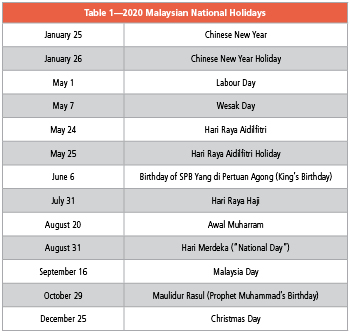
As the old saying goes, only two things in life are certain—and one of those is taxes. Malaysia is no exception to this. Whether you are an expat or a national, your salary will be subject to income tax in this Southeast Asian country. Below is an overview of how the tax system works in Malaysia.
For a full overview of payroll and tax in Malaysia, see the March Global Payroll Country Spotlight article.
Malaysian Tax Number
As an employer, the first step to getting your tax compliance right is to make sure your employees are issued a tax number. This is a simple process, and you will need the following documents:
- Copy of the latest salary statement (EA Remunerization Form for private sector/EC for public sector) or latest salary slip
- Copy of identification documents
- Copy of marriage certification (if applicable)
You can obtain tax numbers for your employees online or by visiting one of the Lembaga Hasil Dalam Negeri Malaysia (Inland Revenue Board) branches. If you are a contractor, you will need to do this yourself, but as an employee, your company will take care of this for you.
Tax in Malaysia for Residents
Tax rates for residents run on a sliding scale up to 30% depending on the level of income. If you have workers rotating in and out of Malaysia, they may still qualify for a residency tax rate providing they fit into one of the following criteria:
- If they have been in Malaysia for 182 days per calendar year
- If they have been in Malaysia for fewer than 182 days in a calendar year but have still been in the country for 182 consecutive days, linked to days from the year immediately preceding that calendar year
- If they have been in Malaysia for at least 90 days in a calendar year for three of the four
preceding years
There are also a few tax exemptions. If you fall into any of the below categories, then you will not pay any income tax:
- Residents who work fewer than 60 days in a year
- Retired people older than 55 years of age
- Those receiving a pension
- Those living off bank interest
Tax for Non-Residents
Expats in Malaysia will become tax residents if they spend 182 or more days in the country. If they spend fewer than 182 days of the year in Malaysia, they will be subject to a flat tax rate of 30%.
The tax year in Malaysia runs from 1 January to 31 December, at which point you will be required to file a tax return (more on that further in the article).
 Some businesses will pay the tax on behalf of their staff, whereas others ask their workers to submit the payment themselves. There is also a fixed monthly SOCSO (social security organization) fee for non-residents of 49.4 ringgit (RM) per month, which is like a national insurance fee.
Some businesses will pay the tax on behalf of their staff, whereas others ask their workers to submit the payment themselves. There is also a fixed monthly SOCSO (social security organization) fee for non-residents of 49.4 ringgit (RM) per month, which is like a national insurance fee.
You will automatically be classified as a non-resident for your first six months in Malaysia and be liable to pay 30% tax from your first day of work.
Tax Return Form
All workers in Malaysia are also required to file an income tax return each year reporting the income they have received. Tax returns must be filed before 30 April of the following year. The government agency that is responsible for tax in Malaysia is the Inland Revenue Board of Malaysia (IRBM). If this form is not completed by the employer or worker, the Malaysian government may issue a fine.
This tax return form can be completed online, or you can appoint a payroll partner to complete it on your behalf. To do this, you will need the following:
- Income Tax Number of worker
- Copy of worker’s latest salary statement (EA/EC) or latest salary slip
- PIN for online system (if this is your first time paying taxes in Malaysia, you will need to register with the IRB and obtain a PIN
Here is a helpful website for the tax return form (https://www.hasilnet.org.my/tag/itrf/).
Tax Clearance, Tax Filing
All staff employees must complete tax clearance and tax filing at year-end. The financial year is from 1 January - 31 December. Tax filing must be completed by April.
Here is a helpful website for Tax Clearance in Malaysia (https://help.talenox.com/en/articles/2882809-guide-to-tax-clearance-in-malaysia).
Do you like our content? Join the GPMI community to get free education and articles straight to your inbox!

Rob Day joined Leap29 in 2008 after graduating from the University of Durham with a business degree. He is now an Account Manager looking after the workforce management for one of Leap29’s major clients, including the onboarding and payroll of candidates across North America, Europe, the Middle East, and South East Asia.